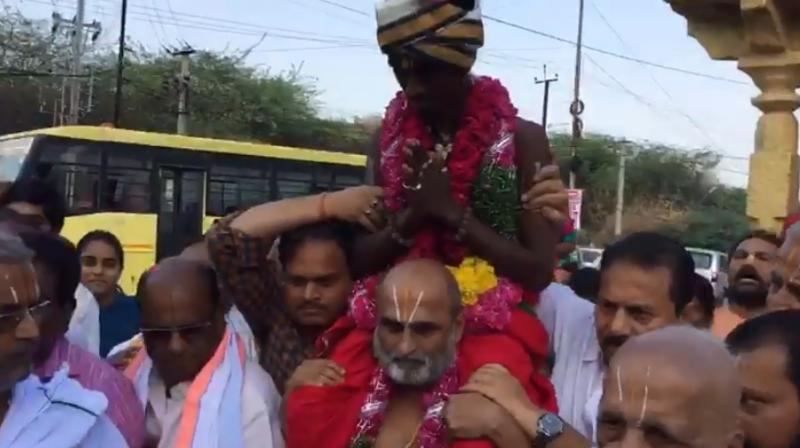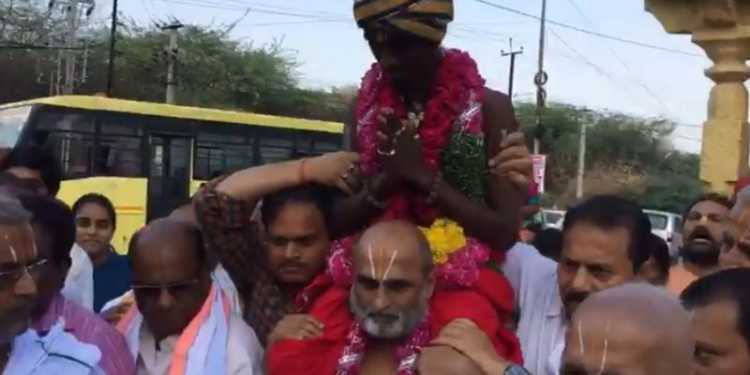It was a surreal scene when the head priest of the Rangantha Swamy Temple carried a Dalit man on his shoulders to the inner sanctum to proclaim the equality of all men before god. The Ranganatha Swamy Temple is located on the banks of river Jiyaguda. The entire temple vicinity was reverberated with Vedic chants and ceremonious spirit as the head priest took this humane approach to showcase the true nature of Sanatana, the nature of truth and compassion.

The ritual included the 60-year-old priest carrying the Dalit devotee named Aditya Parasri on his shoulders. Later, the priest circumambulated around the temple with the devotee on his shoulder, thrice After that was completed, the ritual saw the head priest taking the devotee to the inner sanctum as chants of Lord Vishnu rang in the background. The priest also helped the devotee make a prayer offering to the deity and then the priest went on to take Aditya on a tour around the temple grounds and to have Darshan of the presiding deity.
Amid growing tensions around the country regarding the decimination of safeguards to Dalit rights by consecutive governments, this act conveys the true nature of Hindu ideals. This act also serves as an antidote to the viciously divisive narrative spread by people for political purposes. This ritual which is also known as ‘Munivahana Seva’ is a tradition that goes back several centuries.
According to a legend as stated by the high priest, this ritual was performed nearly 2000 years ago as a sage named Loka Saaranga came to the river Kaveri to draw water. There, he encountered a man belonging to the Pannar community, who were traditionally treated as untouchables according to Tamil literature. After an incident, the sage was directed by Lord Vishnu to carry the Pannar man into the inner sanctum of the temple. After that, the Pannar man was called Thiruppaan Alvar or Thirupaanazhwar, and attained sainthood.
The priest Rangarajan was accompanied by trustees and officials from the endowments department and also the former MP S. Venugopala Chary during the ritual.
Rangarajan also heads the movement for getting temples out of government control. He stated that he visits all kinds of devotees from all walks of life and during one of such occasion Aditya approached him to learn more about Dharma and its nature. Rangarajan stated that because all are equal before god it’s only justified that they be allowed to practice their faith without any discrimination.
The head priest observed –
“While performing religious rituals at Chilkur Balaji Temple every day, I interact with the devotees in order to know their views on our Dharma. One Dalit devotee, who was observing Ayyappa Swamy Deeksha, wanted to know from me, if all are equal before god, why Dalits who observe Ayyappa Deeksha, are asked to prepare their food, separately. After that, some Dalit intellectuals pointed out about the recent attacks on SCs in the country. Then, I told them that Hindu Dharma treats all men equally. I informed them about the incident of Sage Loka Saaranga carrying an outcaste man on his shoulders into the Ranganatha Temple, 2,000 years ago. Then, the asked me to do the same now. Immediately, I accepted. (sic)”
This actually shows the true nature of Hinduism and how it has a self rectifying approach towards life and dharma. There is no absolute in Dharma, thus Hindu ideals are not dictatorial in nature and the religion has no qualms about accepting its shortcomings and rectifying them. This makes the Dharmic concept of Hinduism an extremely democratic and progressive one.




















